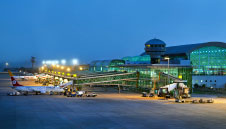
In 2012 TAV Airports Holding handled 72 million passengers – a +36% increase on 2011, and saw also 575,000 flights arrive at and depart from its 11 airports, +28% more than in 2011. This year, total throughput is expected to reach 85 million passengers through organic growth.
When TAV Airports began life with the inauguration of its newly constructed international terminal at Istanbul Atatürk Airport in 2000, it handled 9.5 million passengers. Over the years that followed, TAV set in motion consistent and substantial growth in Istanbul, together with the 10 other airports it has developed and operates, and in 2012 handled 72 million passengers, a +36% increase on the previous year. TAV Airports Holding also saw a +28% increase on 2011 in terms of movements – 575,000 flights arrived at and departed from its Istanbul Atatürk, Ankara Esenbo?a, ?zmir Adnan Menderes and Antalya Gazipa?a airports in Turkey; Tbilisi and Batumi airports in Georgia; Enfidha-Hammamet and Monastir Habib Bourguiba airports in Tunisia; Skopje and Ohrid airports in Macedonia; and Riga Airport in Latvia last year – and in 2013 – explained Dr. Waleed Youseff, Director, Middle East Region at TAV Airports Holding – numbers are continuing to escalate. “We continue to grow, and during the first quarter of 2013 we realised our highest first quarter in terms of passengers served, revenues, EBITDA and net income,” he said. “This year, we expect to reach 85 million passengers through organic growth.”
Synergetic expansion
With a steadfast foothold in Turkey, TAV Airports Holding is now continuing to expand its increasingly powerful presence in the Middle East. In May its sister company TAV Construction was awarded a major contract to build the new US$400 million (€310 million) Terminal 5 at Saudi Arabia’s King Khalid Airport in Riyadh, and is also constructing the Midfield Terminal at Abu Dhabi International Airport, as well as airside facilities at Oman’s Muscat International Airport. “We are optimistic that our synergy with TAV Construction will further enhance our regional position, especially following our success in Medina (Saudi Arabia), the first fully privatised airport in the Gulf region,” Youssef commented.
Together with Al Rajhi Holding Group, and construction firm Saudi Oger, TAV signed a Build Operate Transfer contract with GACA (the Civil Aviation Authority of Saudi Arabia) that will see the consortium manage Medina Airport for 25 years following its construction of the new passenger terminal, which will be completed in early 2015. The state-of-the-art terminal forms part of one of the most important airports in Saudi Arabia, and will initially increase capacity to eight million passengers a year.
In addition, following its acquisition of the International Terminal at ?zmir Adnan Menderes Airport, TAV is also developing its new Domestic Terminal, and will operate it for 20 years. The environmentally friendly 200,000sqm terminal will have an initial capacity of 13 million, and will be equipped with the latest technology, due for completion in early 2014.
Expansion throughout TAV’s portfolio extends as far as its airports’ route networks too. “TAV Airports places a great deal of emphasis on route development activities for all its airports. All major travel and tourism events, fairs and conferences are attended by TAV with the purpose of scheduling face-to-face meetings with airlines’ network planners to discuss route development opportunities,” Youssef explained. “Istanbul, Gazipa?a and Skopje airports all expanded their route networks last year by adding 26, eight and six new destinations to their networks respectively. We assess the opportunities to expand networks of every airport we operate.”

Youssef: “TAV operates an unconventional business model that relies on the provision of integrated services to passengers. In fact, TAV and its subsidiaries are engaged in all the passenger ‘touch points’, including airport security, check-in and boarding, food & beverage, passenger lounges, duty free, and airport IT.” Most recently came the implementation of an innovative Passenger Information System at Istanbul Atatürk Airport.
TAV quality and industry firsts
“TAV operates an unconventional business model that relies on the provision of integrated services to passengers,” Youssef said. “In fact, TAV and its subsidiaries are engaged in all the passenger ‘touch points’, including airport security, check-in and boarding, food & beverage, passenger lounges, duty free, and airport IT.” The operator’s all-encompassing approach enables it to provide an exceptional airport experience for its passengers, as well as consistently reinvigorating and optimising its product, with minimal externalities.
Recently, the operator reinforced the renowned ‘TAV quality’ for its passengers at Istanbul Atatürk Airport with the implementation of an innovative Passenger Information System. Developed by TAV IT Systems, the interactive touch screen kiosks provide passengers with everything from wayfinding assistance to weather forecasts for a simplified airport journey. “We are furthermore harnessing information technology to not only ease the passenger experience and operations, but also to maximise our commercial revenues. Finally, we are long-term investors and developers, so we don’t hesitate to make short-term investments where we expect long-term gains,” Youssef added.
Activities in project finance are also critical to TAV’s proliferating success and consistent growth. “We financed 10 major airport projects of more than US$4 billion [€3.1bn] during the last 13 years,” Youssef said. ”We work with a pool of 30 international lenders and eight development institutions on the basis of structured/project finance, in addition to a range of short to long-term credit lines with almost all Turkish banks.”
As a result of its intelligent project financing strategy, TAV has achieved a long list of global firsts. In 2005 Istanbul Atatürk Airport became the first lease-type public-private partnership (PPP) in Turkish financing, setting precedents for numerous further infrastructure financings in the country. TAV also implemented the first long-term PPP financing in Georgia and Macedonia, while in Tunisia, it brought about the first long-term private airport financing in North Africa and in Saudi Arabia realised the first fully Sharia-compliant airport financing.
Sustainability strategy
TAV’s vision for successful growth is one of clear-cut strategy, and one in which sustainability, environmental efficiency and Corporate Social Responsibility play a significant part. “In line with the company’s mission, vision and the sustainability strategy, TAV Airports systematically monitors, evaluates, reports and improves its performance through economic, environmental and social KPIs,” Youssef explained. “Believing in the collaborative nature of the issue, the company is reporting its sustainability performance since 2010, adhering to the global standards set out by Global Reporting Initiative. Furthermore, TAV is among the 32 companies in Turkey that participate in the Carbon Disclosure Project.”
In addition, TAV Airports Holding has also been active in ACI EUROPE’s Airport Carbon Accreditation since its launch. Istanbul Atatürk Airport was upgraded to Level 2: Reduction in October 2012, while ?zmir Adnan Menderes and Ankara Esenbo?a airports are accredited at Level 1: Mapping. Through the initiatives and actions implemented by TAV, between 2011 and 2012 Istanbul Atatürk Airport limited the increase of carbon emissions to +3.3% amid a +21% passenger growth. “Ankara Esenbo?a and ?zmir Adnan Menderes airports have achieved -6.2% and -2.2% decreases in carbon emissions respectively, despite increasing passenger numbers, and TAV’s Enfidha-Hammamet will soon become the first accredited airport in Africa,” Youssef added. “In this respect, TAV persistently strives to meet the highest standards in corporate management, employee rights, efficient use of natural resources and minimising the environmental impact of its operations and contributing to local communities,” he concluded.







